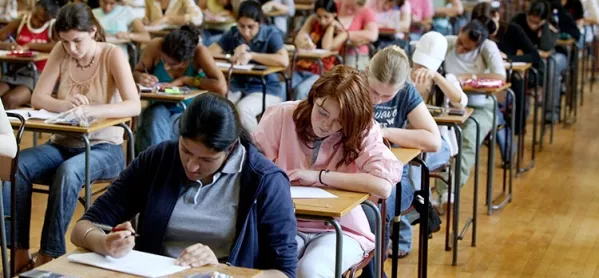One of the country’s biggest assessment companies is looking at whether school pupils could help to weed out errors in test papers before students sit public exams, Tes can reveal.
Simon Lebus, the chief executive of Cambridge Assessment, suggested that students might be better at spotting errors “hiding in plain sight” than the adult subject experts who currently proofread papers.
Last summer the OCR exam board - which is run by Cambridge Assessment - landed itself in hot water with an error in a GCSE English literature paper on Romeo and Juliet.
A question in the paper wrongly implied that a character in the play, Tybalt, was not a member of the Capulet family. The exam asked students: “How does Shakespeare present the ways in which Tybalt’s hatred of the Capulets influences the outcome of the play? Refer to this extract from Act 1 Scene 5 and elsewhere in the play.”
The error provoked a storm of complaints on social media, and resulted in OCR apologising to students and changing its mark scheme.
Speaking exclusively to Tes, Mr Lebus said that Cambridge Assessment had “pretty rigorous processes” for detecting errors, which included “having question paper setters and senior examiners actually sit the papers themselves live”.
Human error ‘inevitable’
But he said there was “inevitably” an “exposure to human error”.
“The error… in terms of Romeo and Juliet was one of those ones which I’m afraid was just hiding in plain sight, and lots of experts looked at it,” he added.
“It’s rather like one of those things in Private Eye where they have a sort of misprint and you read it four or five times before you realise what it is.
“Those sorts of things are very difficult to prevent, however rigorous you are and however robust your processes.”
However, Mr Lebus said that Cambridge Assessment was looking at whether young people themselves could be enlisted to help to spot errors.
“What we are doing is actually looking at some of the psychology associated with proofreading and question paper checking,” he said.
“One way, rather than getting subject paper experts to do it, would be to get 17- or 18-year-olds to do the papers.”
Mr Lebus conceded that there would be “potential problems” with this approach, “not least the lack of enthusiasm of 17- or18-year-olds for doing discretionary exams”.
Another issue would be the potential threat to the integrity of the exams if some students saw questions before their peers sat the papers.
But Mr Lebus said there could be ways around these “quite serious practical problems.”
“I think you’d probably need to have a large question paper bank, so they would be testing stuff that might appear in a paper sometime in the next four years or something,” he said.
“Or you would have A-level kids checking GCSE papers or whatever so they were sufficiently removed.”
However, Mr Lebus said it was probably impossible to eliminate errors from exams altogether.
“We have actually invested quite a lot in trying to improve question paper production in order to avoid that sort of thing, but we haven’t achieved universal success and I don’t think we or any of the other boards will ever be in a position where we can absolutely guarantee zero errors.
“There is scope for improvement but we will never reach zero-error, I believe.”
Want to keep up with the latest education news and opinion? Follow Tes on Twitter and like Tes on Facebook




